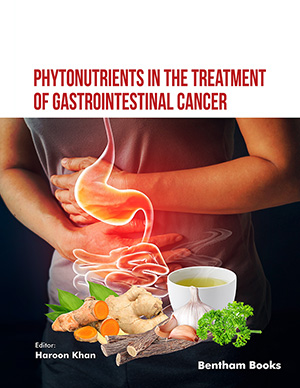Abstract
Globally, cancer is a leading cause of death next to cardiovascular disease. Gastrointestinal malignancies (GI) are extremely widespread malignancies, but their prevalence varies significantly amongst nations and communities. Existing cancer treatments are primarily concerned with low tissue availability, adverse drug reactions related to the demand for larger dose levels and non-specificity of the medicine. Phytochemicals have been important resources of preventive and curative entities for a variety of diseases, such as cancer. To a certain extent, enough investigation has been made over the last few decades to investigate natural compounds that possess anticancer properties. Phytochemicals used in the management of malignancies appear to be obligatory, serving as the cornerstone for the latest medicine as well as a rich reserve of novel medicines. Flavonoids are plant-derived secondary metabolites, which are readily available and considered safe, depicting perfect agents for cancer therapy or as adjunctive options in clinical practice. Flavonoids have already received increasing attention as anti-cancer entities, with promising findings as cytotoxic anti-cancer entities that induce apoptotic cell death in malignant cells. Flavonoids, such as kaempferol, Quercetin, Curcumin, myricetin, apigenin, luteolin and silymarin, are among the phytochemicals that have been revealed to be potential agents for the prevention and treatment of malignancies. Flavonoids like Kaempferol and luteolin are reported as potential therapeutic agents for the management of ovarian and GI malignancies. Flavonoid metabolism in major areas of the hepatic and colon cells, unveils reasonably considerable variations in the anti-cancer potential, presumably as a result of exposure to multiple metabolites with multiple functions. Luteolin and apigenin have a real insight into cervical cancer. Flavonoids are now explored to have an inhibitory action on cell cycle development at the G1/S or G2/M stages of the cell cycle via modifying several regulatory proteins of the cell cycle. This chapter is designed to provide comprehensive knowledge about flavonoids, their targeted mechanism of action in the management of GI cancer, clinical findings of flavonoids, synergistic effect with other anti-cancer medicines and future prospects of flavonoids in treating GI carcinoma.
Keywords: Clinical standings, Effect and Future prospects, Flavonoids, GI cancer, Mechanistic pathways, Synergistic.






















